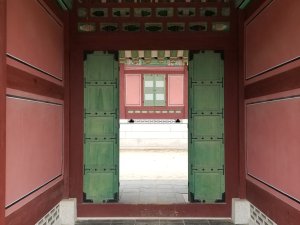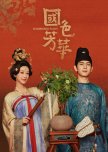Are Women Human?
The answer, according to the historical time of this drama, is "No." Women are property and bargaining chips, to be treated and sold as the men in their lives see fit. Even the women who are loved by the men in their lives are still not treated as fellow humans.
But our drama, of course, has other opinions.
I will rework some thoughts I had after watching Season 2, In The Name of Blossom, in this review so I don't give away too much of that season's beats and only include the parts relevant to this season. But I have finished both seasons, so just know I'm keeping both in mind as I write this review.
As @PeachBlossomGoddess's review states very insightfully, one of the overarching themes of this drama is that none of these characters seems to have the freedom to be what they want to be, and each character is a case study on how people respond to scenarios where this reality is the case. Mu Dan, Liu Chang, Jiang Chang Yang, Sheng Yi, the Emperor--no one is exempt!
This is more of a theme in this season than Season 2, but it never goes away. So many of these characters feel trapped by their role and fate in society (whether they're poor, someone without connections, a wife helpless against her husband who's beating her, a woman who cannot be anything but second-class, a concubine vying amongst other concubines for her husband's attention, a son or a daughter who cannot go against their parents, etc.), and into such a backdrop, enter our leads.
They are solidly modern (and progressively so even according to many 21st century standards), and are a stark contrast to most of the characters in this drama who are stuck in their historical roles. (This of course, does not mean our leads don't have progress/growth to work through; that's was Season 2 deals with.)
The sub-theme of this drama is the question asked in my title. Related questions explored are some of the following: If women ARE human, what does that mean for them? Are they free to choose how to live their lives, and how does that mean men/husband/fathers should treat them? Must women depend on men to be happy and flourish in life?
Mu Dan is not perfect, but she fights for flourishing, not only for herself, but also for any pitiable soul she encounters along the way. She refuses to believe that flourishing comes from anyone but herself, and never places her hopes for happiness on another. She's fiercely optimistic, and as clever as they come. She never lets anything faze her. She often projects her own dreams and goals onto the more impressionable women she saves in order to give them an alternate and better future, and this is one of her blind spots. She's well-intentioned, but her efforts don't always work out how she expects or hopes.
What I found refreshingly different about this drama was our male lead, Jiang Chang Yang. I thought Jiang Chang Yang was a fascinating case study in how the man in a relationship can function, and I kind of loved his character. I ended up loving that he was rarely there to swoop in and save her when she encountered trouble (or when he tried, she had already gotten herself out of it by the time he showed up; in those moments when the ML usually flies in to the save the day, Jiang Chang Yang was noticeably absent), and trusted her to make her own choices, solve her own problems, and win her own battles. He only helps her when she asks for it. The role he played had its own, unexpected charm, and felt refreshingly new. I think the word that comes to mind that describes how he treats Mu Dan is "dignity"--it's what Jiang Chang Yang extends to Mu Dan as a fellow human, not just as "a woman." Not something you see very often in a romance, and somehow they still managed to make their interactions romantic, even though this is a very nontraditional relationship dynamic that many are probably not used to.
These two unique characters slowly become closer and grow more attached as they work together, spend more time together, and grow in admiration for each other while vowing never to marry (heh, take a guess at how that goes for them! :P). That's where Season 1 leaves off, and Season 2 begins.
These questions about the dynamic between man and woman/husband and wife is one of the themes that largely characterizes Season 2. How can a husband and wife be individuals and respect one another's autonomy, while also caring so much for each other that they never want to be parted from each other or see harm come to the other?
Buckle up for an angsty ride if you want to see the drama's answer to that quandary in Season 2!
But our drama, of course, has other opinions.
I will rework some thoughts I had after watching Season 2, In The Name of Blossom, in this review so I don't give away too much of that season's beats and only include the parts relevant to this season. But I have finished both seasons, so just know I'm keeping both in mind as I write this review.
As @PeachBlossomGoddess's review states very insightfully, one of the overarching themes of this drama is that none of these characters seems to have the freedom to be what they want to be, and each character is a case study on how people respond to scenarios where this reality is the case. Mu Dan, Liu Chang, Jiang Chang Yang, Sheng Yi, the Emperor--no one is exempt!
This is more of a theme in this season than Season 2, but it never goes away. So many of these characters feel trapped by their role and fate in society (whether they're poor, someone without connections, a wife helpless against her husband who's beating her, a woman who cannot be anything but second-class, a concubine vying amongst other concubines for her husband's attention, a son or a daughter who cannot go against their parents, etc.), and into such a backdrop, enter our leads.
They are solidly modern (and progressively so even according to many 21st century standards), and are a stark contrast to most of the characters in this drama who are stuck in their historical roles. (This of course, does not mean our leads don't have progress/growth to work through; that's was Season 2 deals with.)
The sub-theme of this drama is the question asked in my title. Related questions explored are some of the following: If women ARE human, what does that mean for them? Are they free to choose how to live their lives, and how does that mean men/husband/fathers should treat them? Must women depend on men to be happy and flourish in life?
Mu Dan is not perfect, but she fights for flourishing, not only for herself, but also for any pitiable soul she encounters along the way. She refuses to believe that flourishing comes from anyone but herself, and never places her hopes for happiness on another. She's fiercely optimistic, and as clever as they come. She never lets anything faze her. She often projects her own dreams and goals onto the more impressionable women she saves in order to give them an alternate and better future, and this is one of her blind spots. She's well-intentioned, but her efforts don't always work out how she expects or hopes.
What I found refreshingly different about this drama was our male lead, Jiang Chang Yang. I thought Jiang Chang Yang was a fascinating case study in how the man in a relationship can function, and I kind of loved his character. I ended up loving that he was rarely there to swoop in and save her when she encountered trouble (or when he tried, she had already gotten herself out of it by the time he showed up; in those moments when the ML usually flies in to the save the day, Jiang Chang Yang was noticeably absent), and trusted her to make her own choices, solve her own problems, and win her own battles. He only helps her when she asks for it. The role he played had its own, unexpected charm, and felt refreshingly new. I think the word that comes to mind that describes how he treats Mu Dan is "dignity"--it's what Jiang Chang Yang extends to Mu Dan as a fellow human, not just as "a woman." Not something you see very often in a romance, and somehow they still managed to make their interactions romantic, even though this is a very nontraditional relationship dynamic that many are probably not used to.
These two unique characters slowly become closer and grow more attached as they work together, spend more time together, and grow in admiration for each other while vowing never to marry (heh, take a guess at how that goes for them! :P). That's where Season 1 leaves off, and Season 2 begins.
These questions about the dynamic between man and woman/husband and wife is one of the themes that largely characterizes Season 2. How can a husband and wife be individuals and respect one another's autonomy, while also caring so much for each other that they never want to be parted from each other or see harm come to the other?
Buckle up for an angsty ride if you want to see the drama's answer to that quandary in Season 2!
Was this review helpful to you?























